
Athlitikos Syllogos Aris Thessalonikis, means Athletic Club Aris Thessaloniki, is a major Greek multi-sport club founded on 25 March 1914 in Thessaloniki.
The history of modern Turkish painting can be traced back to the modernization efforts in the Ottoman Empire during the Tanzimat period, in the 19th century. This article contains a brief history of Turkish painters and art movements from the mid-19th century to the present.

Lieutenant General Theodoros Pangalos was a Greek general, politician and dictator. A distinguished staff officer and an ardent Venizelist and anti-royalist, Pangalos played a leading role in the September 1922 revolt that deposed King Constantine I and in the establishment of the Second Hellenic Republic. In June 1925 Pangalos staged a bloodless coup, and his assumption of power was recognized by the National Assembly which named him prime minister. As a "constitutional dictator" he ruled the country until his overthrow in August 1926. From April 1926 until his deposition, he also occupied the office of President of the Republic.
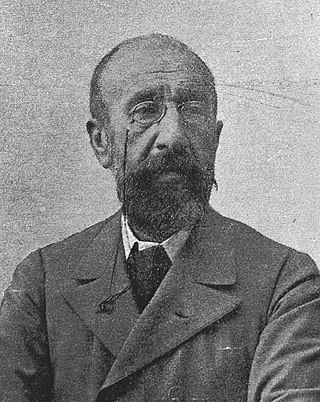
Osman Hamdi Bey was an Ottoman administrator, intellectual, art expert and also a prominent and pioneering painter. He was the Ottoman Empire's first modern archaeologist, and is regarded as the founding father of both archaeology and the museum curator's professions in Turkey. He was the founder of Istanbul Archaeology Museums and of the Istanbul Academy of Fine Arts known today as the Mimar Sinan Fine Arts University. He was also the first mayor of Kadıköy.

The 1913 Ottoman coup d'état, also known as the Raid on the Sublime Porte, was a coup d'état carried out in the Ottoman Empire by a number of Committee of Union and Progress (CUP) members led by Ismail Enver Bey and Mehmed Talaat Bey, in which the group made a surprise raid on the central Ottoman government buildings, the Sublime Porte. During the coup, the Minister of War, Nazım Pasha, was assassinated and the Grand Vizier, Kâmil Pasha, was forced to resign. Soon after the coup, the government fell into the hands of the CUP, now under the leadership of the triumvirate known as the "Three Pashas", made up of Enver, Talaat, and Cemal Pasha.

Ahmed Tevfik Pasha, later Ahmet Tevfik Okday after the Turkish Surname Law of 1934, was an Ottoman statesman of Crimean Tatar origin. He was the last grand vizier of the Ottoman Empire. He held the office three times, the first in 1909 under Sultan Abdul Hamid II, and from 1918 to 1919 and from 1920 to 1922 under Mehmed VI during the Allied occupation of Istanbul. In addition to his premiership, Ahmet Tevfik was also a diplomat, a member of the Ottoman Senate, and long time Minister of Foreign Affairs.

Mehmet Cavit Bey, Mehmed Cavid Bey or Mehmed Djavid Bey was an Ottoman economist, newspaper editor and leading politician during the dissolution period of the Ottoman Empire. As a Young Turk and a member of the Committee of Union and Progress (CUP) had positions in government after the constitution was re-established. In the beginning of the Republican period, he was controversially executed for his alleged involvement in an assassination attempt against Mustafa Kemal Atatürk.
Tawfik, or Tewfik, is an Arabic masculine given name. The name is derived from the Arabic root: waaw-faa-qaaf (و-ف-ق), which means to agree or to reconcile. Tawfik translates to, "the ability or opportunity to achieve success". A spelling of Tewfik or Toufic is used more among French speakers. Tawfik can be used as a given name or surname. Since it is considered a "neutral" name in the Arabic language, many Arabic-speaking Christians as well as Muslims are named Tawfik. The Turkish equivalent is Tevfik, the Azerbaijani equivalent is Tofig or Tofiq, the Albanian equivalent is Tefik, the Bosnian equivalent is Teufik. Taoufik and Toufic are common in North Africa. Thoufeeque, Thoufeeq and Thoufeek are common in India. A phonetically similar Jewish name is Tovik or Tuvik (תוביק), actually a Yiddish diminutive of the Biblical Hebrew name Toviyah, which led to the Greek equivalent Tobias (Τοβίας).
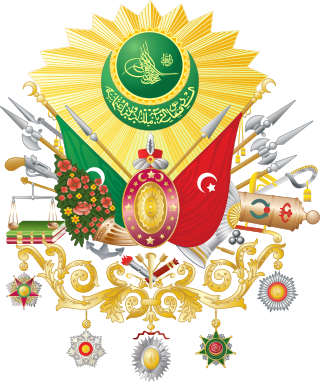
The following outline is provided as an overview of and topical guide to the Ottoman Empire:
Osman or Usman is the Turkish, Persian, and Urdu transliteration of the Arabic masculine given name Uthman.
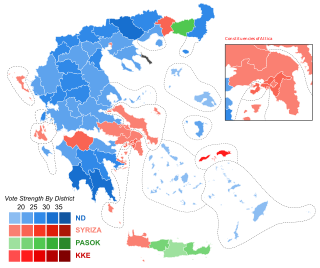
Legislative elections were held in Greece on Sunday, 6 May 2012 to elect all 300 members to the Hellenic Parliament. It was scheduled to be held in late 2013, four years after the previous election; however, an early election was stipulated in the coalition agreement of November 2011 which formed the Papademos Cabinet. The coalition comprised both of Greece's traditional major political parties, PASOK on the left and New Democracy (ND) on the right, as well as the right-wing Popular Orthodox Rally (LAOS). The aim of the coalition was to relieve the Greek government-debt crisis by ratifying and implementing decisions taken with other Eurozone countries and the International Monetary Fund (IMF) a month earlier.
Konstantinos Raktivan was a Greek jurist and politician, who served as cabinet minister, as the de facto first Governor-General of Macedonia, president of the Athens Bar Association and of the Council of State, Speaker of the Hellenic Parliament and member and president of the Academy of Athens.

The Municipality of Thessaloniki is the second largest municipality by population in Greece after the Municipality of Athens. According to the 2021 Greek census, it has a population of 319,045 inhabitants. The municipality includes the historical center and about one third of the Thessaloniki Urban Area.
Şehzade Mehmed Abid Efendi was an Ottoman prince, the son of Sultan Abdul Hamid II and Saliha Naciye Kadın, and brother-in-law of King Zog I of Albania.
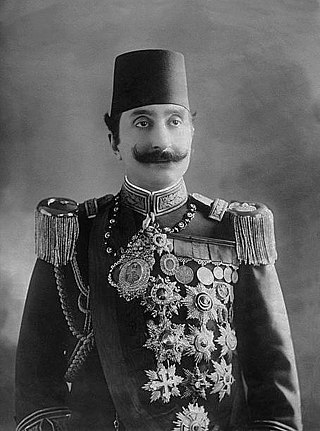
Şehzade Mehmed Selim Efendi was an Ottoman prince, the eldest son of Sultan Abdul Hamid II and his consort Bedrifelek Kadın.

Şehzade Mehmed Burhaneddin Efendi was an Ottoman prince, son of Sultan Abdul Hamid II and Mezidemestan Kadın.
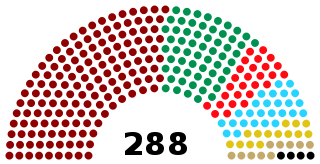
The Third Chamber of Deputies of the Ottoman Empire was elected in the 1908 Ottoman general election, which was called following the Young Turk Revolution. The new parliament consisted of 147 Turks, 60 Arabs, 27 Albanians, 26 Greeks (Rum), 14 Armenians, 10 Slavs, and four Jews. Including the amount of deputies elected in by-elections, the total amount of seats included 288 deputies. On 17 January 1912, through an imperial decree, the Sultan Mehmed V dissolved the Chamber of Deputies and called for new elections within three months.












